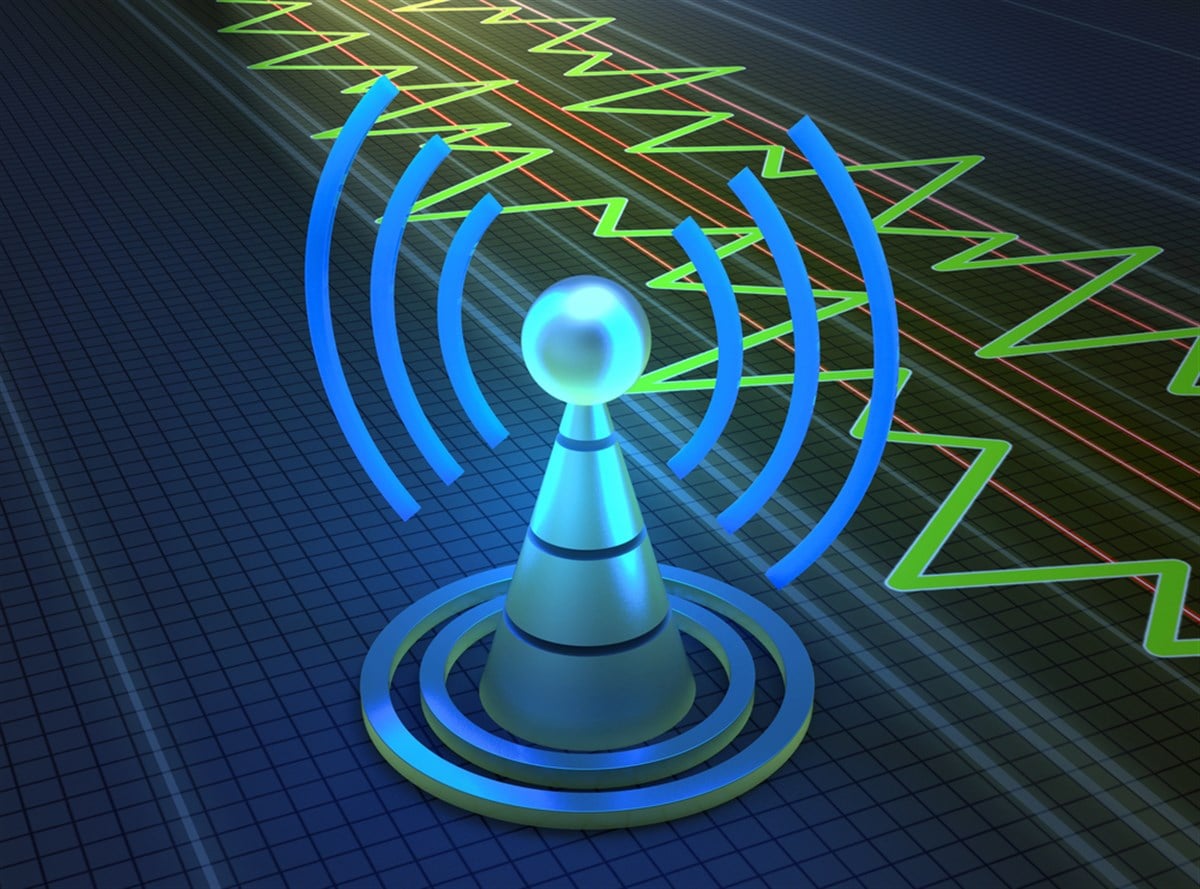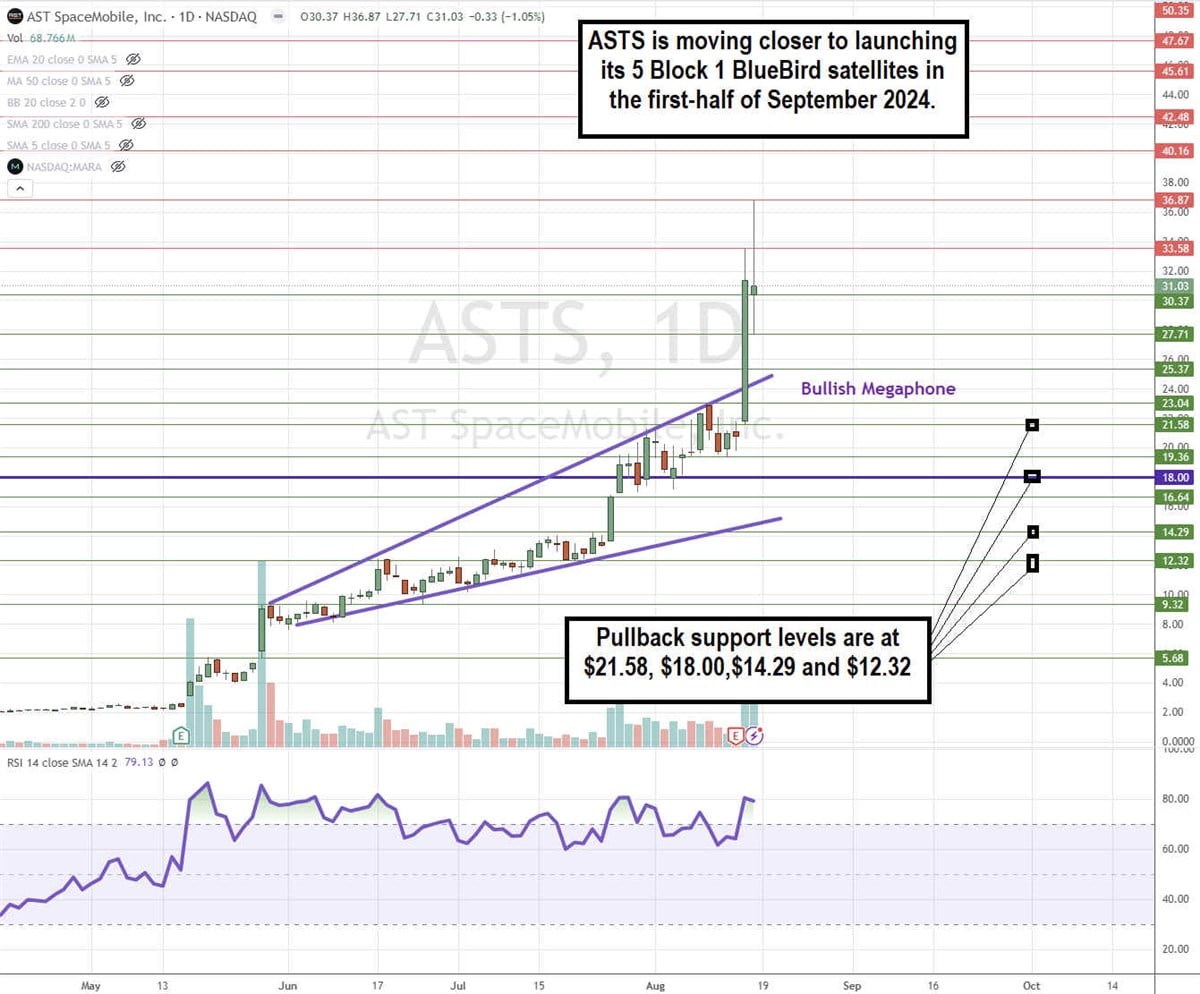
AST SpaceMobile Inc. (NASDAQ: ASTS) stock rocketed 50% following its Q2 2024 earnings report. The company missed EPS estimates for a loss of 51 cents by 29 cents, and revenues were non-existent at $900,000. Investors may be questioning the sanity of the large price move, while short-sellers are licking their wounds after being sucked in by the 20.44% short interest.
The company is embarking on creating the world's first and only space-based cellular broadband network capable of satellite direct-to-cell 5G connection.
The goal is to launch 168 total Bluebird satellites for $5 billion to cover every inch of the planet, eliminating any dead zones and providing worldwide space-based satellite cellular broadband connectivity using off-the-shelf smartphones.
AST SpaceMobile operates in the computer and technology sector. The company is in the pre-revenue phase but competes with satellite operators, including Rocket Lab USA Inc. (NASDAQ: RKLB), Planet Labs PBC (NYSE: PL), Starlink operated by Tesla Inc. (NASDAQ: TSLA) CEO Elon Musk and Momentus Inc. (NASDAQ: MNTS).
Why Build It When You Can Lease It?
Rather than putting up countless more cellular towers to provide last-mile coverage to rural customers, mobile network operators (MNOs) find it way more cost-effective to contract with AST SpaceMobile’s space broadband network to provide the extra coverage. This is the appeal for MNOs to jump on the bandwagon as AST sets up its network. AST SpaceMobile has contracts and memorandum of understanding (MOUs) with 50 mobile network operators (MNOs) worldwide.
AT&T and Verizon Jump on Board
Major telcos AT&T Inc. (NYSE: T) and Verizon Communications Inc. (NYSE: VZ) are 2 of the major telcos to have definitive agreements in place. On May 6, 2024, AT&T signed a 6-year commercial agreement for AST SpaceMobile to provide space-based cellular broadband coverage of every inch of the United States to their customers through 2030. The agreement adopts a revenue-sharing model.
Verizon committed to a $100 million deal also targeting 100% geographical coverage of the United States for its customers using the premium 850 MHz cellular spectrum. The satellite direct-to-cell deal is comprised of $65 million in commercial payments and $35 million in convertible notes. Speaking of convertible notes, the company currently has 17.5 million warrants.
20 Days Above $18 Triggers 17.6 Million Warrants ay $11.50 per Share
AST previously issued 17.6 million warrants exercisable at $11.50 per share if the stock remains above $18.00 for 20 out of 30 days. This has the potential to result in $202 million in proceeds at a cost of 7% dilution of shares. ASTS breached the $18.00 price trigger on July 26, 2024.
Part of the short interest is likely from warrant holders "shorting the box" to lock in profits. This means they are shorting ASTS at current levels to cover their shorts at $11.50 when the warrants are exercised. The net effect would have little impact on the price since the shorts wouldn’t be buying back shares to close the position in the open market.
However, dilution would occur since new shares are being added to the total outstanding shares, which could negatively impact the stock.
AST Second-Quarter 2024 Earnings Nothing Burger
Since AST is in its pre-revenue period, earnings reports are just an opportunity to get an update on its path to commercialization. AST has stated that it will start to collect commercial revenues upon the launch of its first 5 Blue Bird satellites for Block 1. The company reported an EPS loss of 51 cents missing consensus estimates by 29 cents. Revenues were just $900,000.
Update on Commercialization
The initial Block 1 will consist of 5 BlueBird commercial satellites, which have been delivered and paid for at a cost of around $30 million each. These are capable of U.S. nationwide non-continuous coverage with over 5,600 cells in the premium low-band spectrum.
This rollout will be available to AT&T and Verizon beta test users in the coming months following in-order service activation. This will make cellular broadband available everywhere in the U.S. for existing cell phones with no modifications. However, it will need 45 to 60 satellites to provide continuous voice, text and data coverage. The Block 1 satellites have been delivered and await launch during the first half of September 2024.
Expanding Coverage with More Satellites at More Costs
Coverage will gradually increase as the satellite constellation grows with Block 2, comprised of 17 BlueBird satellites manufactured at its Texas facilities. Block 2 BlueBirds will be much larger than the Block 1 satellites. Block 2 BlueBirds are 233 square meters compared to Block 1 BlueBirds, spanning 64 square meters.
The first of 17 Block 2 satellites will be ready to launch in Q1 2025. They will be outfitted with in-house chips enabling 10 gigahertz of processing bandwidth, which is 10X the capacity of Block 1 satellites. At least 4 Block 2 BlueBirds could be deployed on a single mission to low earth orbit (LEO), which is an altitude up to 1,200 miles. The company has spent $1 billion over 7 years generating over 3,400 patents and patent pending claims.
Awaiting Regulatory Approval
While the Federal Communications Commission (FCC) grated AST conditional approval on Aug. 5, 2024, to deploy and operate its 5 Block 1 BlueBirds, it deferred its decision to grant permission to test its services with the cellular frequencies it wants to use in the United States. The FCC also has to decide on AST's plans to add and operate the additional 243 satellites and permission to provide commercial services to off-the-shelf smartphones in the United States.
The Need to Raise More Capital
The company expects around 95% of the manufacturing of satellite components and subsystems will be vertically integrated since AST owns the IP and controls the process. The company closed the second quarter with $287.5 million in cash. While the company expects to burn through $35 million in cash per quarter, the Block 2 satellites consisting of 17 BlueBirds could cost upwards of $510 million.
The company has stated that it has no plans for a secondary stock offering in 2024. The company will focus on collecting more prepayments and getting financing from state-backed export credit agencies for future capital, which would provide lower financing costs and more favorable lending terms.
The 17.6 million warrants will also result in $222 million in additional proceeds, which could cover the costs of the 17 BlueBirds. By Q2 2025, AST will also start generating commercial revenues. However, the company will need upwards of $5 billion to reach its goal of having 168 BlueBirds in space, providing complete global coverage.

ASTS Stock Triggers a Bullish Megaphone Breakout
The daily candlestick chart for ASTS illustrates a rare bullish megaphone breakout. This pattern is comprised of higher highs and higher lows but in a diverging channel rather than a parallel channel. The breakout triggers when shares pierce the upper trendline. The daily relative strength index (RSI) surged to and stalled around the 79-band. Pullback support levels are at $21.58, $18.00, $14.29 and $12.32.
